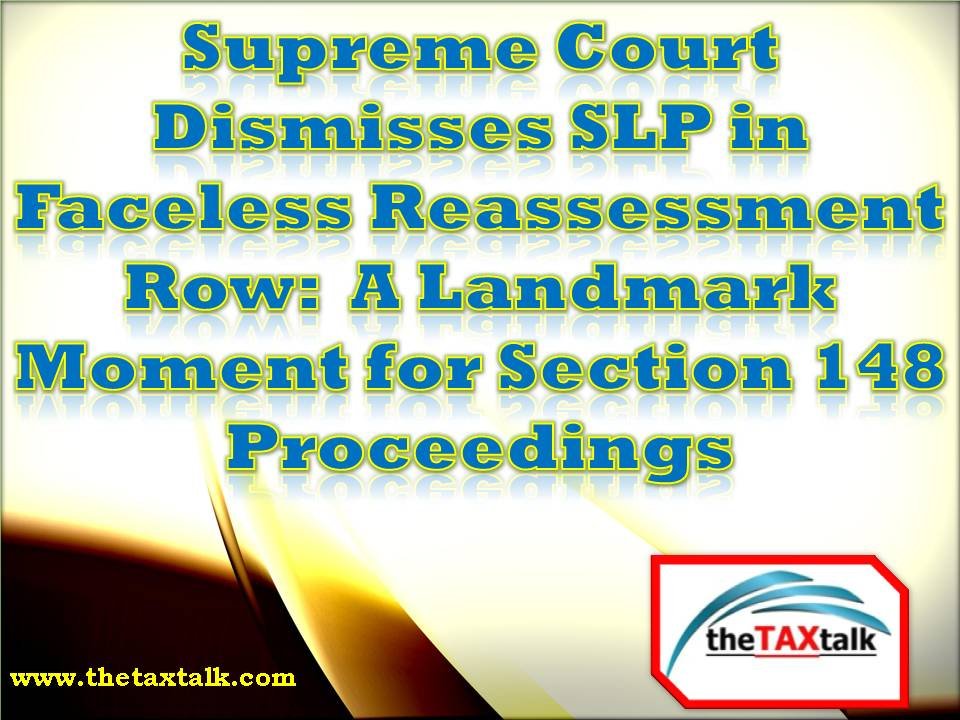![]()
Supreme Court Dismisses SLP in Faceless Reassessment Row: A Landmark Moment for Section 148 Proceedings
Introduction
In one of the most anxiously awaited rulings of recent times, the Supreme Court of India dismissed the Special Leave Petition (SLP) filed by the Revenue in the matter of ADIT (International Taxation) 2, Hyderabad vs. Deepanjan Roy on July 16, 2025. With this dismissal, the Supreme Court affirmed the Telangana High Court’s ruling, which had categorically held that notices under Section 148 must comply with the faceless procedure laid out under the e-Assessment of Income Escaping Assessment Scheme, 2022.
The ruling has sent ripples across the tax fraternity, especially among those dealing with reassessment in international taxation cases – a domain previously considered exempt from faceless reassessment protocols.
Background: What Sparked the Controversy?
The case revolved around Section 148 notices issued in 2022 by the local jurisdictional Assessing Officer (JAO) to a non-resident taxpayer. The challenge raised was that such notices were not issued via the faceless mechanism mandated under Section 151A read with the Notification dated 29.03.2022, and therefore, void.
The Revenue’s counterargument was straightforward but aggressive:
• CBDT’s order dated 06.09.2021excluded cases handled by International Taxation from faceless assessments.
• Thus, officers of international taxation could still issue notices under Section 148 and conduct reassessment proceedings without going faceless.
The High Court, however, rejected this reasoning-and now the Supreme Court has refused to intervene.
Telangana High Court’s Reasoning (W.P. No. 13353/2024 Batch)
In its detailed order dated 24.07.2024, the Telangana High Court made several critical observations:
1. Clause 3(b) of the e-Assessment Scheme, 2022explicitly mandates that issuance of notice under Section 148 shall be through automated allocation and in a faceless manner.
2. The CBDT’s exemption order dated 06.09.2021 pertained to assessment ordersand not to issuance of notices under Section 148.
3. The faceless mandate is distinct for assessment/reassessmentand for issuance of notices. Merely because international tax cases are excluded from faceless assessments, it doesn’t exempt them from faceless issuance of notices.
4. It upheld and relied upon the Bombay High Court’s judgment in Hexaware Technologies Ltd. (2024) 464 ITR 430 (Bom), which also adopted the same reasoning.
5. The phrase “to the extent provided in Section 144B” applies only to assessment/reassessment stages—not to the issuance of Section 148 notices.
Supreme Court’s Final Word
The Revenue’s SLP (Diary No. 33956/2025) was dismissed in limine by the Supreme Court on 16th July 2025, with the Bench of Hon’ble Justices J.B. Pardiwala and R. Mahadevan observing:
“Having heard the learned counsel and having gone through the materials on record, we find no good reason to interfere with the impugned order passed by the High Court.”
This one-line dismissal, though terse, effectively seals the position laid down by the Telangana High Court and the Bombay High Court.
Key Legal Takeaways
1. Section 151A & Notification dated 29.03.2022:
-
- Explicitly includes issuance of notice under Section 148within the purview of faceless reassessment.
- There is no exemption carved out for international tax units at the notice stage.
2. CBDT Order dated 06.09.2021:
-
- Relates only to assessment ordersunder Section 144B, not notices under Section 148.
- Cannot override a statutory scheme notified under Section 151A.
3. Supreme Court Dismissal:
-
- Though not a reasoned judgment, dismissal of SLP confirms the High Court’s interpretation as the prevailing law.
- This binds quasi-judicial and administrative authorities unless reversed in a future larger bench ruling.
Implications for Tax Professionals
• Reassessment notices issued manually by JAOs (even in international tax cases)are now highly susceptible to challenge and invalidation.
• All notices under Section 148 post-29.03.2022 must be faceless– the Revenue cannot rely on internal instructions or departmental circulars to avoid this.
• Tax professionals may now proactively challenge defective Section 148 notices issued in violation of the faceless mandate – even if assessments have concluded.
• NRIs and non-residents, often assumed to be outside the faceless net, are not exemptfrom these procedural protections.
Closing Thoughts
This ruling cements the jurisprudence that procedural compliance under the Income-tax Act is not a mere formality-it’s a constitutional obligation. The trend of issuing Section 148 notices casually or based on territorial jurisdiction without adhering to the faceless protocol now stands judicially condemned.
The takeaway is loud and clear: Faceless means faceless – and there’s no face-saving workaround.
Suggested Next Steps for Practitioners
• Review all open reassessment cases initiated post-29.03.2022.
• Check whether the Section 148 notices were issued via automated allocationand routed through NaFAC.
• File writ petitionsto quash manually issued notices wherever procedural lapses exist.
• Consider claiming refund of taxes paid under such invalid reassessments where appropriate.
The copy of the order is as under:


